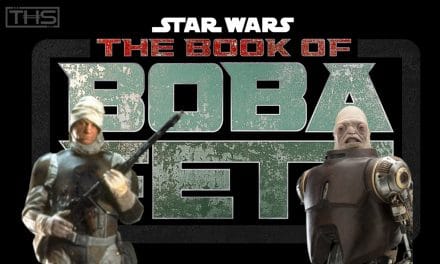Disney recently released the first season of its new short film collection Launchpad, which spotlights diverse creators and stories.
You can learn the inspiration and incredible stories behind the six films featured below.
The Last of the Chupacabras
In a world where culture has nearly ceased to exist, one lone Mexican-American struggling to carry on her traditions unknowingly summons a dark and ancient creature to protect her.
Writer/Director Jessica Mendez Siqueiros on the inspiration behind The Last of the Chupacabras:
“The film was inspired by the fact that my great grandma Chapa lived until she was 100 years old. She died five days after her 100th birthday. My family has always been very, very proudly Mexican. I realized after she died, after I had 25 years on this earth with her, that I didn’t gather the information that I should have from her. That left me feeling like a bit of a failure to my own culture and really realizing that the responsibility is on us to keep our cultures alive.
When I was prompted with what to propose for Launchpad, I started to think about what that meant on a mythical level. The way we look at culture in this country can also be with such a perspective of fear – a perspective of losing our own culture for fear of celebrating somebody else’s.
The best way for me to represent that was through a creature that was also very fearsome. I looked to the chupacabra and paired that in this fable together to comment on how celebrating our own cultures isn’t a challenge to the American mixing pot. It’s actually a celebration of what we can be.”
Dinner Is Served
A Chinese student at an elite U.S. boarding school realizes excellence is not enough when he tries out for a leadership position no international student has ever applied for.
Writer/Director Hao Zheng on the inspiration behind Dinner Is Served:
“Dinner Is Served is about a Chinese student in an elite US boarding school trying to apply for a leadership position no international student has ever applied for. It’s pretty much based on my own experience when I first came to the States. I was 15 back then. I went to a high school in New York, and I just felt like nobody knew me when I first landed. I really wanted to have people see me, so I applied for Maitre D’ of the dining room. Every night during dinner, that person is the one that everyone sees because they announced the dinner. I decided to apply for that.
My pronunciation and just the fact that I had to memorize 30 tables of people’s names was such a difficult task. I tried my best, but then towards the end of the tryout day, I still felt that I’m probably not going to get this. I felt so much pressure that I went up to the stage. I rang the bell and then I started to sing this song in Chinese, and nobody understood me. It was very awkward, but then afterwards for some reason, I just felt very happy. The story I wanted to share with Dinner Is Served is how we embrace our own voice, even though it may be awkward, even though maybe nobody will understand.”
American Eid
Ameena, a Muslim Pakistani immigrant, wakes up on Eid to find out that she has to go to school. Homesick and heartbroken, she goes on a mission to make Eid a public-school holiday, and in the process, reconnects with her older sister, and embraces her new home, while her new home embraces her.
Writer/Director Aqsa Altaf on the inspiration behind American Eid:
“I realized that I grew up watching films that did not represent people that look like me, or stories that were like mine, or even people that are around me. None of it was represented on a big screen. I started internalizing that we’re not just important enough or valuable enough or “cool enough” or worthy enough to be on the big screen. And that is such a toxic thing to think as a child.
Then as I grew older, the toxic negative stereotypes of Muslims in media just enhance that even further. This created such a big ceiling by the Western world over us that it was like, “If we don’t do it, who will? If we don’t start cracking that ceiling that was created for us one story at a time, who will?” One story isn’t going to be enough to crack that ceiling, but it’s a crack. And one crack will build another crack, will build another crack, and eventually, will just have more of a nuanced, dimensional, proper representation of my religion and culture on screen, hopefully.
I remember my little actress for Amina (Janessa) looked at me and she was like, “I want to be an actor.” Then towards the end, she goes, “Maybe I want to be a director instead.” That idea, that this little girl was on set and watching filmmakers making films with so much passion…that’s something I didn’t get growing up. I didn’t have anybody to look up to that I was like, “Oh, I can be a filmmaker.” That just got me so emotional, thinking about how this generation now is going to have these dreams early on because of direct representation. I just got so excited for the future.”
The Little Prince(ss)
When Gabriel, a 7-year-old Chinese kid who loves ballet, becomes friends with Rob, another Chinese kid from school, Rob’s dad gets suspicious about Gabriel’s feminine behavior and decides to intervene.
Writer/Director Moxie Peng on the inspiration behind The Little Prince(ss):
“The Little Princess is very dear to my heart because it was based on my life experience growing up in China as a child. I was five. I was like Gabriel. I was very into feminine stuff, pink and princess. I became friends with this kid in our neighborhood, and his dad started to have a suspicion of us and think I’m a bad influence. One day he came over to our dinner table and he told my dad that I was not normal and I needed to be fixed. I started to cry. I thought I let down my family. My dad got very upset. He took my side and really stood up for me ,and said that he loved me for who I was.
I think that event really resonated with me because it was the first time I really discovered that the word can be unfriendly. I also discovered that there will be people who will accept you for who you are. I think I carry that message with me. With Launchpad, I really wanted to bring that to the story and to showcase that queer and trans kids are not alone. We always care. We are always having each other’s back.
Shooting that dinner scene was very nerve-wracking for me. On the day of the shooting, my little actor Kalo was like, “Moxie, did this happen to you when you were a child?” I was like, “Yes.” Then he said he was very sorry that there’s mean people like that guy. Then he said he hopes that I learned to move on and to find people who love me. He’s only seven and the fact that he told me this and he was understanding the story is a healing process for me. It was really amazing.”
Growing Fangs
Val Garcia, a Mexican-American teen who is half human/half vampire, has had to keep her identity a secret from both worlds. But when her human best friend shows up at her monster-infested school, she has to confront her truth, her identity, and herself.
Writer/Director Ann Marie Pace on the inspiration behind Growing Fangs:
“I think in so many ways, my story in and of itself is about being multifaceted in your identity. Val’s struggling with being half human, half vampire. I grew up Mexican-American and bisexual, and coming from these different identities was like having my foot in either world and trying to figure out what that meant.
I think something I had to learn later in life was that being a part of multiple identities doesn’t make you any less of that identity, but it all compounds and makes you fully who you are. In the story, that’s what I wanted too. As a filmmaker, that’s something that I take forward in all of my storytelling. Really grasping from all the different experiences and taking them as a part of myself to fully be able to make these stories complete.
A moment that will really stay with me was actually the first day of shooting. Launchpad really encouraged us to hire a diverse cast and crew. On that first day of shooting, we all piled around to have our safety meeting. I remember looking around, and I had never seen so much diversity on a set before. It was really profound for me to see. I had a realization that all of us on set together had experienced at one time or another, what it’s like to be an outsider in our own way. To have those people all together, making a story that they feel passionate about because they themselves have experienced it is really powerful. I think when you have people tell their own stories, not just the director, but actors and crew members, something really beautiful happens and you feel that passion and love and life experience through the screen.”
Let’s Be Tigers
Avalon’s not ready to process the loss of her mother, but when she’s put in charge of a 4-year-old for one night, she finds more comfort than she ever could have expected.
Writer/Director Stephanie Abel Horowitz on the inspiration behind Let’s Be Tigers:
“At the time that I was writing Let’s Be Tigers, my zany, my grandpa was going to be 100 just like Jessica’s grandma. My parents were going to be 70 and my nephew was going to be four. I was just thinking about this passing of the baton of life that was happening. In my 20s, I was a babysitter and I took care of this really cute four-year-old kid who was so loving and so smart and so incredible and taught me about love, I think.
One day, he tried to shoot me dead with his finger gun and I was like, “Do you know what that means?” He didn’t and I said, “Well, if I was dead, I wouldn’t be here anymore, and I wouldn’t get to spend time with you, and we wouldn’t get to play.” He was really sad. As we would all be, that’s a sad, sad thing. It just got me thinking about the simple tragedy of our lives. That we’re all going to die, and everyone in our lives is going to die. In that, we’re all going to experience suffering and loss over and over and over again. How do we talk about that in our culture? How do we share that? How do we talk to kids about difficult things?
More personally, I am the child of a therapist, and I’m very good at listening, but I’m a lot less good at sharing. I think that’s really what the film is about. It’s like a reminder to me and anyone else, that very brave act of sharing your sadness, or your pain, or your feelings of being unwanted or unloved or unheard…That is really something that creates community, that creates togetherness, that can remind you that you’re not alone in those difficult moments.”

All of these Launchpad season 1 short films are available to stream now on Disney+.




